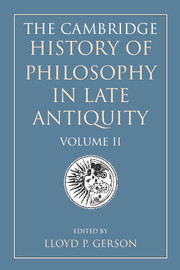Book contents
- Frontmatter
- VI Late Platonism
- Introduction to Part VI
- 32 From Constantine to Justinian
- 33 Plutarch of Athens
- 34 Syrianus
- 35 Proclus
- 36 Ammonius Hermeiou and his school
- 37 Damascius
- 38 Olympiodorus
- 39 Simplicius of Cilicia
- 40 John Philoponus
- 41 Priscian of Lydia and Pseudo-Simplicius on the soul
- VII The third encounter of Christianity with ancient Greek philosophy
- VIII Philosophy in transition
- Appendix: List of works of ancient authors
- List of abbreviations
- Bibliography
- Index locorum
- General index
- References
36 - Ammonius Hermeiou and his school
from VI - Late Platonism
Published online by Cambridge University Press: 28 May 2011
- Frontmatter
- VI Late Platonism
- Introduction to Part VI
- 32 From Constantine to Justinian
- 33 Plutarch of Athens
- 34 Syrianus
- 35 Proclus
- 36 Ammonius Hermeiou and his school
- 37 Damascius
- 38 Olympiodorus
- 39 Simplicius of Cilicia
- 40 John Philoponus
- 41 Priscian of Lydia and Pseudo-Simplicius on the soul
- VII The third encounter of Christianity with ancient Greek philosophy
- VIII Philosophy in transition
- Appendix: List of works of ancient authors
- List of abbreviations
- Bibliography
- Index locorum
- General index
- References
Summary
LIFE
Ammonius the son of Hermeias (c. 435/45–517/26) was the most important – at times, perhaps, the only important – pagan teacher of pagan philosophy in Alexandria from the late fifth into the early sixth century. He numbered among his students Asclepius of Tralles, John Philoponus, Simplicius and probably Olympiodorus, all known at least in part for their commentaries on Aristotle, and the first two of whom published commentaries said to be ‘from the voice’ or ‘from the lectures’ of Ammonius, while Olympiodorus considered himself, and perhaps was also officially, Ammonius’ successor in the Alexandrian chair of philosophy. In the concrete, personal sense, at least, Ammonius was the founder of an ‘Alexandrian’ school of Aristotelian interpretation.
Whether and in what sense Ammonius also made significant alterations in the philosophical system he inherited from his own teacher Proclus in Athens, and thereby originated an Alexandrian variant of late Platonism, has been widely debated. This question, forcefully raised by K. Praechter in 1910, hangs closely together with the conditions of Ammonius’ life and teaching in Alexandria.
After the murder of Hypatia by a mob of Alexandrian Christians in 415, the most authoritative professor of philosophy in Alexandria was Hierocles. But Athens’ older philosophical school headed by Hierocles’ teacher Plutarch and Plutarch’s young Alexandrian pupil Syrianus was apparently more attractive for ambitious Alexandrians. Accordingly, Hermeias, among others, left his native Alexandria for Athens to study with Syrianus, who was head of the school there from 429 until 436.
- Type
- Chapter
- Information
- The Cambridge History of Philosophy in Late Antiquity , pp. 654 - 666Publisher: Cambridge University PressPrint publication year: 2000
References
- 1
- Cited by



